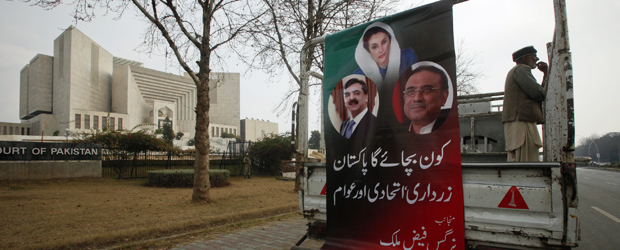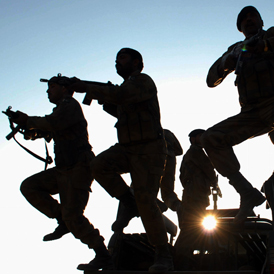Is Pakistan heading for a coup?
Recent events suggest Pakistan could be facing a “behind the scenes coup”, a leading expert tells Channel 4 News.

Last week, UK and Pakistani officials denied a report by the Associated Press that Pakistan‘s Prime Minister Yousef Reza Gilani had contacted the British High Commission in a “panicky” phone call to express fears that a military coup was imminent.
Media reports have described the situation as a stand-off, with the government embroiled in disputes with the judiciary as well as the all-powerful military.
Of all the issues that could break the uneasy truce between the military and the civilian government, the “memogate” scandal is perhaps the most serious. The scandal centres around the discovery of an unsigned memo allegedly drafted by the civilian leadership asking for the help of the United States to rein in the military.
Professor Anatol Lieven is a Pakistan expert at King’s College London. He told Channel 4 News that “memogate” could push the military to act.
“My own reading is that the thing is genuine and the military are furious, and now in a way that they didn’t previously, they actually regard this government as a threat to them,” he said.
The military does not want to take formal power at the moment, they have got enough on their plate. Professor Anatol Lieven
He said this is one of the major reasons why he believes there is now the “possibility of a coup” in Pakistan, alongside a number of other issues which have also ratcheted up tensions – such as the dismissal of the defence secretary and the prime minister appearing in court on contempt proceedings, because he did not re-open a corruption case into President Asif Ali Zardari.
He said: “I think that what the military will try to do if conceivably possible, is not to have an open coup. They will – as is already happening – try to use the judicial process, the investigation of the so-called memogate, to force the prime minister and the president out.
“But then in my view, they won’t then instigate a military government. They will hold elections – this happened a few times in the 1990s with a caretaker government – and it will not be an overt military coup but one behind the scenes.”
‘Too much on their plate’
Pakistan has lived through decades of military dictatorship in its 64 years of existence, and three military coups. But this time round, Professor Lieven does not believe that the military wants power.

“The reason I don’t think we will see a military coup is because the military does not want to take formal power at the moment, they have got enough on their plate with the war against extremists. And it’s too soon – the pattern of military coups in Pakistan is that they happen between seven and 10 years after the last period of military rule.”
He added: “Every government in Pakistan becomes very unpopular because none of them have been able to give the population what it wants. The last thing the military wants now on top of the unpopularity of the civil war against the Taliban, on top of the unpopularity of being seen by much of the opposition as servants of the US – the last thing they want on top of that is to take responsibility for the electricity situation. They would much rather have a civilian buffer.”
Elections
However, he said even this level of coup is “by no means certain” because elections are relatively soon – due by 2013.
“If the situation gets bad, they may be brought forward, so what the military may be able to do is engineer a situation in which they have an earlier election at which point this government, which is extremely unpopular, will be kicked out and there will be some combination of Nawaz Sharif and Imran Khan forming an opposition.”
And what would be the consequences for the rest of the world if this happened?
“Sure it would cause a flurry of headlines but I don’t think myself that the consequences would probably be very dire. Neither Sharif nor Khan are extremists. And as far as security policy or Afghanistan, it doesn’t matter at all because the army runs that anyway, no matter who is in government,” Professor Lieven said.
“The worry is it is another blow to the economy, which is in pretty bad shape already. The other thing to worry about is the more the army gets involved in politics, the more there is a risk of it becoming internally politicised, and you perhaps get junior people saying if we are back in politics, why leave it to the generals? And the ultimate nightmare is Pakistani generals fearing a situation like in parts of Africa, with coups from below, and civil war.
“That’s not a probability – it’s just something to keep in mind. And just because they get rid of this government or have early elections doesn’t mean they will lose control of their nuclear weapons. I would say it’s only the more anxious countries and diplomats who are worried right now.”
Anatol Lieven is a professor in the department of war studies at King’s College London. His book Pakistan: A Hard Country is coming out in paperback this year.





